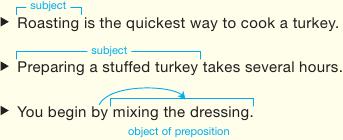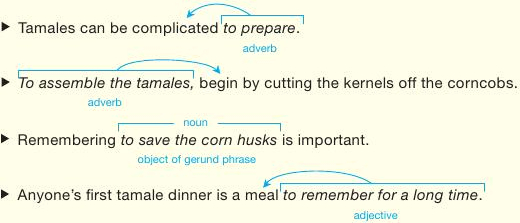R2-c Phrases
dependent clause A word group that has a subject and a predicate but cannot stand by itself as a sentence; it must be connected to an independent clause.
Like dependent clauses, phrases can function as nouns, adjectives, or adverbs in sentences. However, unlike clauses, phrases do not contain both a subject and a verb. (A phrase, of course, cannot stand on its own but occurs as part of an independent clause.) The six most common types of grammatical phrases are prepositional, appositive, participial, gerund, infinitive, and absolute.
preposition A word (such as between, in, or of ) that indicates the relation between a word in a sentence and its object.
Prepositional phrases Prepositional phrases always begin with a preposition and function as either an adjective or an adverb.

Appositive phrases Appositive phrases identify or give more information about a noun or pronoun just preceding. They take several forms. A single noun may also serve as an appositive.
- The baguette, the most popular bread in France, is a loaf about two feet long.
- The king of the breakfast rolls, the croissant, is shaped like a crescent.
- The baker Marguerite makes superb croissants.
Participial phrases Participles are verb forms used to indicate certain tenses (present: sipping; past: sipped ). They can also be used as verbals—words derived from verbs—and function as adjectives.
- At breakfast, we were first served steaming coffee and a simple buttered roll.
A participial phrase is an adjective phrase made up of a participle and any complements or modifiers it might have. Like participles, participial phrases modify nouns and pronouns in sentences.
- Two-thirds of the breakfasts consumed in the diner included sausage and eggs.
- Prepared in the chef’s personal style, the vegetable omelets are served with a cheese sauce flavored with garlic and herbs.
- Mopping up the cheese sauce with the last of his roll, Mickey thought to himself, I could get used to this.
complement A word or word group that describes or restates a subject or an object.
Gerund phrases Like a participle, a gerund is a verbal. Ending in -ing, it even looks like a present participle, but it functions as a noun, filling any noun slot in a clause. Gerund phrases include complements and any modifiers of the gerund.

Infinitive phrases Like participles and gerunds, infinitives are verbals. The infinitive is the base form of the verb, preceded by to: to simmer, to broil, to fry. Infinitives and infinitive phrases function as nouns, adjectives, or adverbs.

Absolute phrases The absolute phrase does not modify or replace any particular part of a clause; it modifies the whole clause. An absolute phrase includes a noun or pronoun and often includes a past or present participle as well as modifiers. Nearly all modern prose writers rely on absolute phrases. Some style historians consider them a hallmark of modern prose.
- Her eyes glistening, Lucy checked out the cases of doughnuts at Krispy Kreme Doughnuts.
- She stood patiently in line, her arms folded to control her hunger, her backpack hanging off one shoulder.